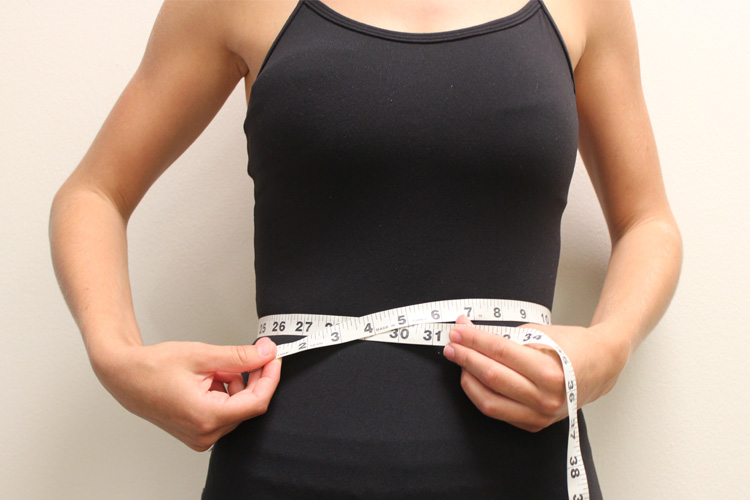On a hot day in October, junior Melanie Kerber navigates through the lunch line and fixes herself a salad comprised of spinach, chickpeas and tomatoes, along with a chicken breast and a glass of water.
Although Kerber makes it a point to eat healthy most of the time, she makes her food choices in the pursuit of a singular goal: losing weight. The high-protein, low-fat diet that Kerber follows is the traditional diet for initial weight loss. But recent research by the Mayo Clinic reveals that the most effective way to lose weight after a “weight loss plateau may be to reevaluate one’s current diet and exercise plan, continue to cut calories and increase muscle definition by strength training.
Balancing the Energy Equation
Eric Godat, Ph.D, a theoretical physics professor at Southern Methodist University, believes that the key to bouncing back from a weight loss “plateau” has to do with increasing metabolism.
The energy that someone expends goes to either one’s metabolism or to kinetic energy – the energy of motion.
Kinetic energy includes exercise such as walking or any other movement that humans perform throughout the day, whereas metabolism processes things such as digestion and homeostasis, or the maintenance of a stable internal environment.
“Your metabolism is highest if you are young and active,” Godat said. “If you are anything but those factors, then your metabolism will be lower.”
One of the ways to increase metabolism is to eat healthy snacks in between meals. According to The Mayo Clinic, eating fruits and vegetables as snacks is a way to feel full without consuming a lot of calories.
Snacking on fruits and vegetables can also end a “weight loss plateau,” because it can help someone feel full until their next meal without adding a lot of additional calories to their daily total.
There is a difference, however, between eating Reese’s peanut butter cups as a late breakfast during advisory and consuming a healthy snack.
“Refined white carbohydrates and sugar aren’t likely to help you feel full for very long,” Godat said. “However, fiber fills you up and speeds up weight loss by increasing the rate at which you burn calories,” he said.
Physics teacher Richard Taylor agrees with Godat but believes that moderation is key – even with healthy foods. “Moderation is extremely important, and the only effective way to lose weight is by reducing the amount of calories you consume,” Taylor said.
A Biological Perspective
According to mayoclinic.org, the body uses up its stored glycogen and loses water weight during the first few weeks of weight loss. However, as you continue to lose weight, your metabolism slows down and causes you to burn fewer calories than you did at your previous weight.
Biology teacher Brandi Finazzo stresses the necessity of changing one’s diet or exercise regime after losing some weight and not seeing progress afterwards.
“Bodies are really good at adjusting to being on a diet, and when you get off of a diet, your body adjusts,” Finazzo said.
According to livestrong.com, a website that provide tools and applications that make it easier to live a better, healthier life, one way to change up your diet and speed up weight loss again is to “carb cycle,” or eat healthy carbs on days that you exercise and half your carb intake on days that you don’t work out.
Kerber, however, sees results with the diet plan and exercise regime that she follows and does not anticipate needing to “carb cycle” in the future because she already has a healthy diet.
“I doubt that I would try a carb cycle because I focus on consistency in my diet everyday,” Kerber said. “If I stopped seeing the results I wanted, I’d be more likely to make sure I’m balancing my carbs, fats and proteins.”
The Science of Fitness
The Mayo Clinic reports that the best way to improve a fitness regime after reaching a plateau is to reassess your workout schedule and increase your metabolism by doing more cardiovascular exercise and strength training to burn calories.
“From a physics standpoint, it is possible that you’ve decreased the amount of energy needed to function once you have lost some weight,” Godat said.
As a goalie for the varsity lacrosse and field hockey teams, Kerber is more interested in improving her muscular strength than her cardiovascular endurance. She follows a workout regimen that consists mainly of free weight exercises such as bicep curls and barbell rows.
Strength training like the kind that Kerber does is critical to bouncing back from a weight loss plateau because muscle burns more calories than fat does, while cardio burns calories immediately.
“Aside from burning calories, cardio stresses and strengthens the heart and the walls of the arterial system,” Finazzo said.
The perfect formula to recover from a weight loss plateau currently does not exist and probably never will because of highly variable factors such as age and body composition.
But science points to a nutrient-rich diet replete with healthy snacks and a regular exercise regime that incorporates strength training as the fundamental way to continue shedding pounds.
“Eating a balanced diet and exercising regularly will speed up your metabolism and cause you to lose weight,” Godat said. “Ultimately, the potential energy in your body, which is stored in your body as fat, will reach a low percentage.”



